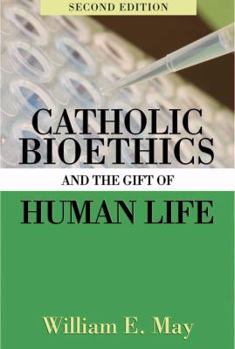Catholic Bioethics and the Gift of Human Life
Select Format
Select Condition 
Book Overview
"In this revision of his already classic text, William May shows us once again the wisdom of the Catholic Church's moral tradition in its application to contemporary bioethics. Illuminating and... This description may be from another edition of this product.
Format:Paperback
Language:English
ISBN:1592763308
ISBN13:9781592763306
Release Date:April 2008
Publisher:Our Sunday Visitor
Length:382 Pages
Weight:1.20 lbs.
Dimensions:1.0" x 5.9" x 8.9"
Customer Reviews
2 ratings
Advance Directives
Published by Thriftbooks.com User , 17 years ago
I particularly appreciated Professor May's treatment of Advance Directives. Pennsylvania's Catholic Bishops have bemoaned that, "Recent court decisions and the enactment of federal and state laws governing advance medical directives (living will or durable power of attorney) have given many the impression that anything the courts or the civil laws allow is morally acceptable" (Nutrition & Hydration: Moral Considerations, revised, 1999). Clearly, that is not the case. As per a September 2002 address to the World Congress of Catholic Medical Associations, Dr. George Isajiw confirms that ethical abuse of advance directives is well under way - even in Catholic hospitals. Professor May cautions that a "living will" may well be "interpreted in a way not envisioned by its signer....it is not advisable to make use of a 'living will' as an advance directive regarding one's health care....The International Anti-Euthanasia Task Force has developed a very worthwhile document called the Protective Medical Decisions Document (PMDD). This is a durable power of attorney for health [care document]... specifically prohibiting suicide, assisted suicide, and euthanasia. It is a document fully compatible with Catholic teaching."
One of the best books available on medical morals!
Published by Thriftbooks.com User , 17 years ago
This book is a wonderful resource for those who want to explore and better understand the moral considerations surrounding those practices and medical procedures that impact human life. May covers the complete range of medical moral issues: reproductive technologies (in vitro fertilization, artificial insemination, fertility drugs, surrogates), contraception, abortion, frozen embryos, ectopic pregnancy, medical experimentation on humans, stem cell research, euthanasia, assisted suicide, the persistent vegetative state, organ transplant, and death itself. His style is extremely readable, and whether you are well-versed in these issues or have little or no familiarity with them, you will nonetheless find the book informative, helpful, and quite approachable. In Chapter 1 May reviews some key Catholic Church documents that deal with the issues covered in his book. These documents serve as the reference point for the material that follows. Chapter 2 is especially good in that May gives his reader a firm understanding of the three components that comprise "the human act" (object, circumstances, and end) and the factors that must be taken into consideration to determine whether any given act is morally good or morally bad. This approach not only enables the reader to comprehend the very "essence" of morality, it also establishes a foundation upon which his later argumentation and lines of reasoning will rest. It's really like an "Introduction to Morality" course condensed into chapter form. The remaining chapters cover the various topics in detail. One particularly strong point of May's book is his coverage of the issues. He does not merely present "his side" of each issue; rather, he embraces the issues in detail and addresses the various "nuances" that surround them. He clearly explains why the Church holds the positions it does on these issues and why those positions are the morally correct ones, and then he brings in opposing views and sifts them logically and morally, suggesting how they ultimately do not hold up to scrutiny. He does so, in my opinion, without harboring a judgmental or condemnatory tone against those who hold these opposing views. Instead, his approach is one that creates an appeal to the reader's intellect. While I was reading the book, I had the sense of being instructed about important matters by a very knowledgeable and patient teacher who genuinely desires that I know what is objectively true and morally right. May also has a copious number of footnotes in his book, and these references are fertile ground for those who wish to pursue the subject matter even more deeply. If you are someone who simply wants to know more about these topics, then May's book will certainly deliver. If you are someone who needs orthodox (i.e., faithful to the Magisterium) resource material for your work (teacher, catechist, Youth Minister, etc.), then May's book will prove to be an indispensable addition to your library.





